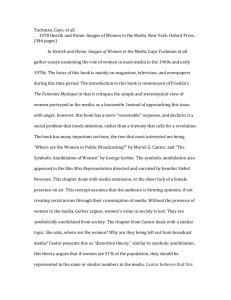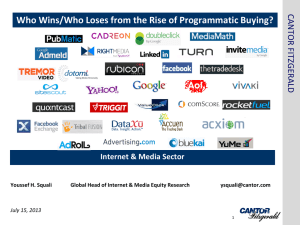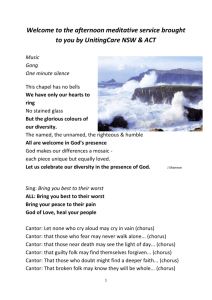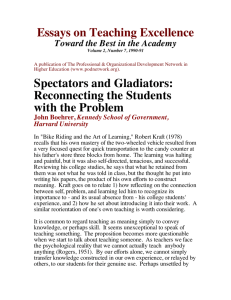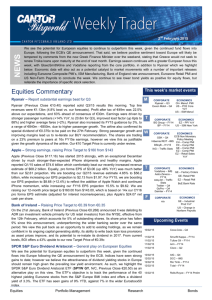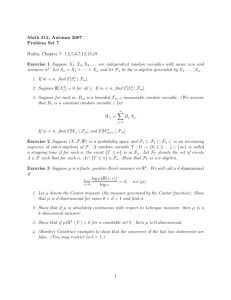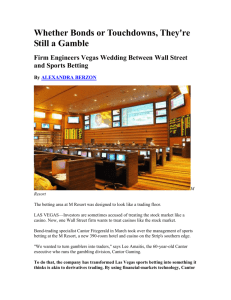SELECT NEWS AND CLIPPINGS 2011
advertisement
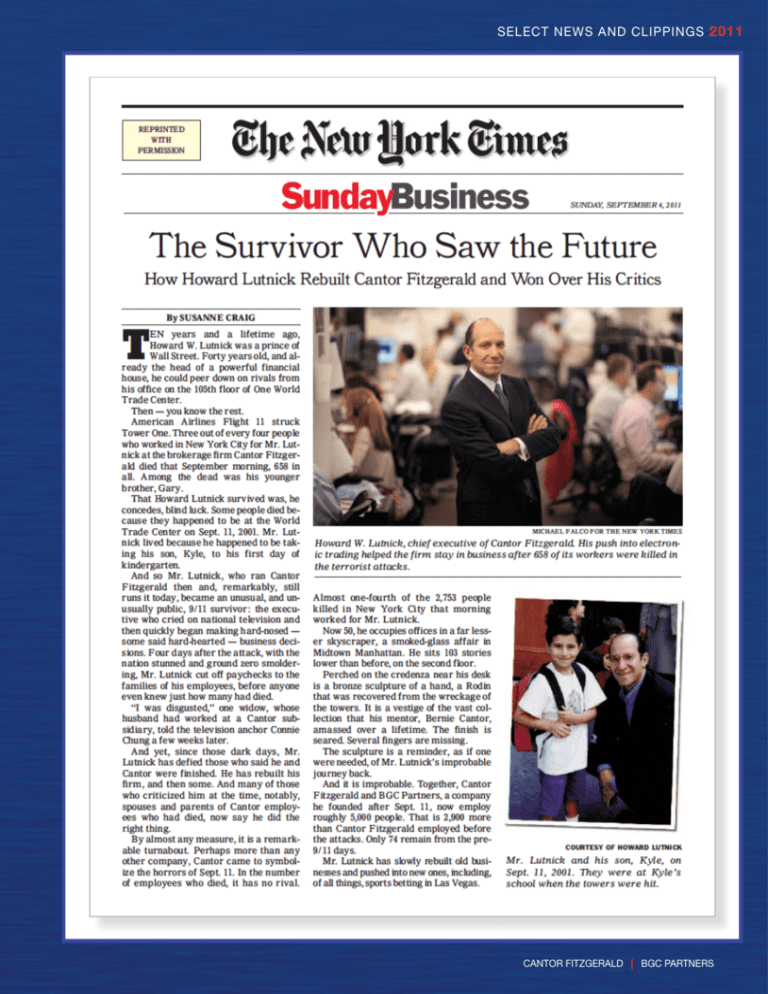
SELECT NEWS AND CLIPPINGS 2011 CANTOR FITZGERALD | BGC PARTNERS TEN YEAR COMMEMORATION OF 9/11 CANTOR FITZGERALD | BGC PARTNERS SELECT NEWS AND CLIPPINGS 2011 CANTOR FITZGERALD | BGC PARTNERS TEN YEAR COMMEMORATION OF 9/11 SELECT NEWS AND CLIPPINGS 2011 16 DAILY NEWS NYDailyNews.com Sunday, August 14, 2011 A PROMISE KEPT From tragedy, Cantor commits big to those it lost N THE NIGHT of Sept. 11, 2001, Cantor Fitzgerald CEO Howard Lutnick picked up the phone in his Manhattan apartment and dialed into a conference call. Lutnick’s brother, best friend and 656 other colleagues were dead. His firm, 960 people strong a day earlier, was decimated. Cantor Fitzgerald CEO Howard Lutnick rebuilt company after loss of hundreds of employees in disaster, and ensured their families would be taken care of financially. DAVID HANDSCHUH/DAILY NEWS Section-Low: MAIN-16 PLATE-SIGZONE:MJ-BW-KSI-QLI,SF,16-16-16-16,B-B-B-B,MAIN-MAIN-MAIN-MAIN,16,73: ####PLATE-EVEN#### MJ-BW-KSI-QLI,SF,16-16-16-16,16,73 - Sun Aug 14 00.34.01 CM YK CANTOR FITZGERALD | BGC PARTNERS O BY RICH SCHAPIRO DAILY NEWS STAFF WRITER On the other end of the line were some of the surviving Cantor employees. “We have two choices,” Lutnick told them. “We could shut the fi rm and attend our friends’ funerals, or we’re going to work harder than we’ve ever worked before to help their families.” The decision was unanimous: Cantor Fitzgerald, Wall Street’s most venerable bond trading firm, would rise from the ashes. The stakes were gargantuan. Lutnick did not announce it then, but he and the other surviving execs harbored grander plans. They vowed to distribute 25% of the firm’s profits to victims’ families for five years and provide them with health benefits for 10. Lutnick revealed the firm’s intentions on Sept. 19. Ten years later, Cantor has handed out more than $180 million to the families and fulfilled its promise to pay their health care. “Cantor was very good to us,” said Bonnie McEneaney whose husband, Eamon, a senior vice president and ex-lacrosse star, perished in the attacks. “They did a great job doing what they said they’d do.” To Lutnick, orphaned at 18 and shunned by his extended family, it wasn’t an easy decision: It was the only decision. “I knew what hell was like and this was my chance to do for the families what my family did not do for me,” Lutnick said from the gleaming Park Ave. office the firm moved into in 2007. “It was a chance for me to express my humanity. “You couldn’t make any other decision on Sept. 11,” added Lutnick, who was taking his son to his first day of kindergarten when the upper floors of the north tower housing the Cantor headquarters were struck. “It couldn’t be about work. It couldn’t be about money.” Those fi rst few days after the attack were pivotal. To the awe of Wall Street, Cantor succeeded in getting its systems running within 48 hours. Still, the fi rm was hemorrhaging $1 million a day, Lutnick said. E mployees worked around the clock in the firm’s London office and in a makeshift space in Rochelle Park, N.J., sleeping in cots lined up along a back wall. On Sept. 13, the firm received a lifeline from JPMorgan Chase in the form of a $70 billion loan. To salvage the fi rm, Cantor execs made a stark decision: If the boss of a business was dead, it would not be reopened. Among the casualties were the corporate bonds and mortgagebacked securities units. Cantor then went on a hiring blitz, bringing on 35 people a week to help rebuild its equities and treasury businesses. By 2004, the firm was on solid footing. “We decided to hit the gas,” said Lutnick, who set a goal of 12 new hires a day. A Cantor spinoff was formed, BGC Partners, a brokerage that CANTOR FITZGERALD | BGC PARTNERS DAIL T S TEN YEAR COMMEMORATION OF 9/11 set emota. in a with New enry Charred from head to toe but grateful for life BY RICH SCHAPIRO ANTHONY DELMUNDO C Peter Gadiel of Kent, Conn., lost his son James (photo l.), and now runs 9/11 Families for a Secure America. handled the dealer-to-dealer business wiped out on 9/11. Cantor, meanwhile, focused on growing as a financial services provider to institutional markets. B GC hired 1,000 people in 2005, Lutnick said. Since then, Cantor and BGC have grown fast. Their combined staffs total 1,500 people in New York. BGC’s revenues topped $1.3 billion last year and the business was poised for gains this year, Lutnick said. Since Cantor Fitzgerald is private, Lutnick wouldn’t disclose its finances, but analysts say the hiring blitz at the height of the recession shows the firm is thriving. It hasn’t all been smooth sailing. Cantor took a hit during the financial crisis as a result of ballooning defaults in home loans. Also, BGC was among a group of brokerage firms subpoenaed by then-Attorney General Andrew Cuomo in 2008 as part of an investigation into trading in credit default swaps. No charges were filed. While Lutnick and his other top execs were rebuilding the firm, 658 families were adapting to life without a loved one. Among the Cantor staff- ers killed was James Gadiel, a 23-year-old junior trader from Connecticut. Gadiel turned down several higher-paid gigs to work at Cantor, calling it the “perfect job.” His dad, Peter, was skeptical for safety reasons. He feared terrorists would try again to strike the twin towers. After his fears were realized, Peter Gadiel was crushed. “For months after, I was in a catatonic state,” said Gadiel, who runs the group 9/11 Families for a Secure America. Gadiel is furious with the feds for failing to protect his son, but has only kind words for Cantor’s chief executive. “Howard went over and above,” Gadiel said. “He’s done everything he can.” Lutnick insists it’s people like the Gadiels that motivate him and his colleagues. For Lutnick, it’s a family affair. His sister, Edie, stepped in to run the Cantor Fitzgerald Relief Fund. Edie and Howard’s third sibling, 34-year-old Gary Lutnick, a Cantor managing director, died in the attacks. As the days creep toward the 10th anniversary of the city’s darkest day, Lutnick says he often thinks about all of the Cantor widows — women he describes as “the most incredible people on Earth.” Just this week, he received an email from one of them. “It is hard to believe that nearly 10 years have passed since my husband Dennis left for work and never returned home,” it read in part. “It was the worst day of our lives. As I reflect back on this time, I want you to know how much my family and I appreciate the help you have provided to us and what a difference it has made in our lives.” CANTOR FITZGERALD | BGC PARTNERS DAILY NEWS STAFF WRITER ANTOR FITZGERALD tax lawyer Harry Waizer strolled into the World Trade Center just before 8:46 a.m. on Sept. 11, 2001, raring to start his workday. The then-50-year-old father of three staggered out minutes later — severely burned from head to toe and his clothes in tatters. Waizer had endured one of the most horrifying experiences imaginable: His elevator suddenly went into a freefall and burst into flames. Twice. The soft-spoken Westchester man suffered burns over most of his body, including in his lungs. He would spend the next seven weeks in a coma. Still, Waizer was one of the very luckiest of Cantor employees that day. He survived. “I was seconds away from joining my friends on the 104th floor, and those seconds were the difference between my survival and my death,” said Waizer, now 60. “Yes, I feel lucky.” Initially, nothing seemed amiss as the elevator Waizer and a woman were in zipped towards the tower’s 104th floor. The elevator was nearing its destination when it started to shake. Then, without warning, it plummeted and erupted in flames. “Everything seemed to be in slow motion,” Waizer said. “There were flames on the floor, carpeting, on the walls.” He said he frantically stamped out the fi re with his canvas briefcase. The elevator stopped abruptly and then started glid- ing down toward the elevator bank on the 78th floor — but the horror was not over. A few floors above, a fi re engulfed the elevator once again. “A fi reball came in the gap of the door, and this one caught me square in the face,” Waizer said. The fi re disappeared quickly, and then the elevator doors opened to the 78th floor. Waizer and the woman joined the flood of shell-shocked workers marching down the emergency stairs. “At a moment like this, you’re not thinking deep thoughts. You are reacting,” Waizer said. “What went through my head is, ‘I had to get down and find help.’ That’s all I thought about it. I had no thought about how injured I might be.” About one-third of the way down, an emergency worker spotted the badly burned pair and cleared the path down for them. After he was rushed to New York-Presbyterian Weill Cornell Medical Center’s burn unit, Waizer was put in a medically induced coma, where he remained until the end of October. Waizer awoke to the news that he had suffered third-degree burns across his face, arms, hands and legs. He learned that terrorists had slammed a plane into the tower. And then, while lying in his hospital bed with his wife standing over him, he got the worst news of all: Most of his colleagues were dead. “I started naming names, but I probably stopped after about a half-dozen,” Waizer said. “I had had enough.” Waizer underwent intensive rehab for months and returned to Cantor in March 2004. Waizer, who works about three days a week, has back pain, nerve damage and lacks strength in his left hand — but still he counts himself fortunate. “I recognize how close I was,” he said. II ast, n Di- 17 CAROLINA HIDALGO K Sunday, August 14, 2011 Section-Low: MAIN-17 PLATE-SIGZONE:MJ-BW-KSI-QLI,4STAR,17-17-17-17,B-B-B-B,MAIN-MAIN-MAIN-MAIN,17,72: ####PLATE-ODD#### MJ-BW-KSI-QLI,4STAR,17-17-17-17,17,72 - Sat Aug 13 21.51.46 CM YK DAILY NEWS NYDailyNews.com ws.com conte for n Gee tus. SELECT NEWS AND CLIPPINGS 2011 Harry Waizer survived a WTC elevator plunge and two fi reballs. CANTOR FITZGERALD | BGC PARTNERS TEN YEAR COMMEMORATION OF 9/11 8 CANTOR FITZGERALD | BGC PARTNERS SELECT NEWS AND CLIPPINGS 2011 CANTOR FITZGERALD | BGC PARTNERS 9 TEN YEAR COMMEMORATION OF 9/11 CANTOR FITZGERALD | BGC PARTNERS SELECT NEWS AND CLIPPINGS 2011 CANTOR FITZGERALD | BGC PARTNERS TEN YEAR COMMEMORATION OF 9/11 SELECT NEWS AND CLIPPINGS 2011 Opposite: a Opposite: a photograph of the photograph of the twin towers covered twin towers covered with tributes. This with tributes. This page: Howard W. page: Howard W. Lutnick, chairman Lutnick, chairman of Cantor Fitzgerald of Cantor Fitzgerald THE CHAIRMAN ‘I wrote a couple of thousand THE CHAIRMAN ‘I wrote a couple of thousand condolence notes.notes. I did itI from 5am’to 5am’ condolence did it2am fromto2am 42 TIM03T1GM_howardlutnick 1-2 TIM03T1GM_howardlutnick 1-2 PAGE 42 00 42 PAGE 42 CANTOR FITZGERALD | BGC PARTNERS 3 September3 2011 September 2011 3 September3 2011 September 2011 00 30/09/2011 12:40 PAGE 43 30/09/2011 12:40 PAGE 43 CANTOR FITZGERALD | BGC PARTNERS TEN YEAR COMMEMORATION OF 9/11 SELECT NEWS AND CLIPPINGS 2011 THE CHAIRMAN PAGE 41: ARISTIDE ECONOMOPOULOS/CORBIS. PAGE 42: MICHEL SETBOUN/CORBIS. THIS PAGE: PETER MORGAN/REUTERS Howard W. Lutnick is chairman and CEO of the investment bank Cantor Fitzgerald, the hardest-hit company on September 11: 658 of its employees – including Lutnik’s brother, Gary, and his best friend, Doug Gardner – were killed in the northern tower. Lutnick, who is married with four children, faced controversy in the weeks after the tragedy when the company was accused of not doing enough to compensate victims’ relatives. He is also chairman and CEO of the brokerage firm BGC Partners, Inc. “If I could somehow do it all over again, I would stand by the doors of the World Trade Centre and not let anyone in. It’s so hard to square what happened to our firm; it’s not possible for all of these people to have been killed together. We hired people we liked. Inside Cantor we really were a great group of people who cared for each other, combining friends and co-workers in a special way. What other firm employs 48 sets of brothers? “After September 11, the purpose of our business became to support the families of those who died. For a long time I couldn’t say the number 658 without crying. I was not capable of dealing with the magnitude. Someone would ask what had happened to someone who had died, and I would see them in my mind’s eye and that was the moment they were killed. I would tell myself, ‘Pull yourself together,’ but it would happen again and again and it went on for months. “That morning, I was taking my son Kyle to his first day of kindergarten. The school administrator told me a plane had hit the building. Immediately I knew I had to go get my guys, help my friends. As we drove down Fifth Avenue, I could see one tower burning. I knew right away it was ours. It was instantly horrible. The driver was crying, ‘It’s bad, it’s bad,’ all the way. I got to the doorway of the building and grabbed people as they came out, asking what floor they were from. I wanted to hear that someone had made it out from ours. “If the northern tower, our building, had collapsed first, I wouldn’t be here. When the southern tower collapsed it sounded gargantuan, combining the roar of a jet engine and a giant creak, like the boat in Titanic. Everyone ran. This tornado of black smoke seemed to be chasing me. I dived under a car, certain I was going to die. I didn’t know what was in the air, but I knew instinctively not to breathe. I thought: ‘I was uptown. I was safe. Now I’m gonna die, son of a gun, I’m gonna die.’ The world was black and silent. I didn’t know if I was blind or deaf. Then I saw my hand, and as the world became grey, I knew I was alive and had to get out of there. “Over the next few weeks, every time I saw someone who worked for us or had worked for us I was so ecstatic I grabbed their face and kissed them. I wrote 2,000 condolence notes. I did it from 2am to 5am. I was having nightmares, so I wrote these notes, sometimes five pages if I knew the person. I would tell stories about them, thinking their children would want the notes some day. “Of course, I had survivor guilt. I wasn’t responsible for what happened to those who had died, but I was responsible for helping their families. That’s what drove me and the employees. I could not have cared less about work. Going home and hugging my wife and family was the number one thing I wanted to do. The only reason to work was to help the families. To the surviving employees I said: ‘We can either shut the firm and go to 20 funerals on 35 days in a row, or work harder than we ever have for the families.’ Our London office was the reason we survived. I don’t know if all those who brought us flowers or sent us food realised how their care and love helped us to survive. Amazingly, we were able to be a profitable company in the first full quarter after 9/11. “Early on I said that the best way to show people who were killed that we loved them was to care for those they loved. In October ‘A tornado of black smoke seemed to be chasing me. I dived under a car, certain I was going to die’ A burnt police car outside the World Trade Centre following the attacks there was a brief period where the media questioned our commitment. But I didn’t mishandle it. I would do it the same way again. We were so decimated we could not afford to make mistakes. We only had criticism from people who didn’t know our plan. With 20/20 hindsight this is what happened. Let’s say we’d written to a young woman who lost her husband. But our human relations department has been wiped out, so we’d written to her at her last-known address – it might not even be current – and anyway, she’s staying at her mother’s. She doesn’t know we have offered 10 years of healthcare and a minimum of $100,000 per family. With 658 families affected, that’s $65 million. “That young woman might have felt we hadn’t done anything for her yet, and of course we hadn’t. But we would. We calculated what we needed to survive, then distributed the money to the families. The figure exceeded everyone’s expectations. We gave 25 per cent of our profits to the families. The surviving workers never let down their dead colleagues in working to support their families. We had so many people join us afterwards. They knew we were in a tough spot and they probably earned less money than they could have gotten elsewhere, but they accepted that we had to take care of the families. There was a relief fund, a victims’ compensation fund; I held ‘town hall’ meetings. My wife set up support groups. “I always felt I would have time to grieve for my brother later. He was mine, he was inside me. I didn’t plan his memorial for months; I didn’t bury the fragments of his bones for almost a year. I had too much to do. I had to go to so many funerals. I had to make sure the firm was capable of caring for these families. I had a spectacular relationship with my brother – I always did. I didn’t really have any unfinished business with him. He knew I loved him and how much I loved him. He helped me because, ultimately, I was able to really talk to the families who had lost loved ones because I was one of them. “Every September 11 we hold a memorial service. We read the names of everyone who died. We have a special charity day every year and a day when everyone forgoes their pay for the day to raise money. We have tried to turn a difficult day into something beautiful. I am proud of how we took care of the families, proud that so many children of those who died have come to work for us. It’s an extraordinary compliment. We are the world’s pre-eminent middle-market investor bank; BGC is the No 2 in the world in the inter-dealer broker market. I am honoured to be associated with both. In the worst of circumstances, these employees covered themselves in glory. It makes me proud every day to walk in the door.” The Times Magazine 45 TIM03T1GM_howardlutnick 3 3 September 2011 CANTOR FITZGERALD | BGC PARTNERS 30/09/2011 12:40 PAGE 45 CANTOR FITZGERALD | BGC PARTNERS TEN YEAR COMMEMORATION OF 9/11 U.S. securities firm Cantor, Majority of employees victims Interview with CEO Lutnick The American securities company Cantor Fitzgerald, which had its offices in the 101st through 105th floors of World Trade Center’s North Tower, suffered devastating damage in the simultaneous terrorist attacks, losing 658 of its 960 employees. We interviewed CEO Howard Lutnick about the struggles to rebuild the company and support victims’ families. ----What were you doing on 9/11? “I was just about to enter the building of my son’s kindergarten, where he was starting his first day, when I received news by phone that the first plane had struck the WTC. I immediately rushed to the site and found many people running out from the building. “In an effort to ascertain the safety of our employees, I asked people at random what floor they had just come down from. But the highest floor among all the people I stopped was the 92nd floor.” ----What is the background behind your decision to rebuild the company? “I asked every employee on the 11th about their choice, between closing the company or rebuilding. The result was, it was their unanimous choice to rebuild. Unanimous decision to rebuild Firm now larger than before the incident “All of the employees who were working in those offices had died and our computer system was completely destroyed, so it was unclear whether it would be possible to restart business. Attending 30 funerals a day for 25 straight days was hard beyond imagination, but rebuilding the company was almost as difficult. “With employees from our branch offices in New Jersey and abroad sleeping on their office floors, the company’s rebuilding was on track by the 19th. At that point we announced that 25% of the company’s profits over the next 5 years, as well as medical insurance for the next 10 years, would be provided to families of the deceased. The primary purpose of rebuilding the company was to provide support to the victims’ families. We recorded a slight profit in the October-December quarter of 2001, and were able to provide to families an initial payment of $45 million at year’s end, and payments of $180 million over 5 years.” ----What difficulties did you face in the rebuilding? “It was a very urgent situation. We were hiring at a pace of 35 per week, and my role was to simply ask in the final interview if they could start work the following week. We also have several tens of employees who are family of those who died. That self-assertive 22, 23-year-old youths would say that they want to work at this company, where their parents’ lives were sacrificed, is a priceless thing. Now the number of employees in New York is 1500, which is more than before 9/11. “Providing emotional support toward victims’ families was just as important as the rebuilding the company. My wife started up a support group for female family members of victims, who were pregnant or had small children. I suffered from sleeplessness and hand-wrote 1700 letters of condolence deep in the night. These were letters addressed to wives, parents and children of the 658 victims.” ----What is the company’s next goal? “We have been able to accomplish our initial goal of supporting victims’ families. The next goal is to repay the employees who have worked so hard. We have split off a portion of our business and listed it on the stock market, but one option is to go public with the main company when the time comes.” ----Please offer counsel to people struggling in the aftermath of Japan’s earthquake. “Think about what happiness is for yourselves and your families, and live to realize it. For example if the restoration of fisheries will bring happiness, I’d want people to work hard to realize that. Helping the families of 9/11 victims is what was important and led to happiness for me, so this is what I have worked for.” Photo caption: Entered Cantor firm in 1983, immediately upon graduation from university. Took up office as President and CEO in 1991, and has held his current position since 1996. Lost his younger brother, who worked for the same firm, in the simultaneous terror attacks. Also serves as a director of the National 9/11 Museum. Lives with wife and 4 children. Age 50. CANTOR FITZGERALD | BGC PARTNERS
